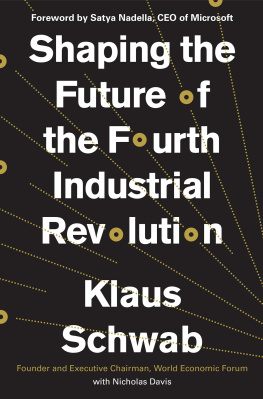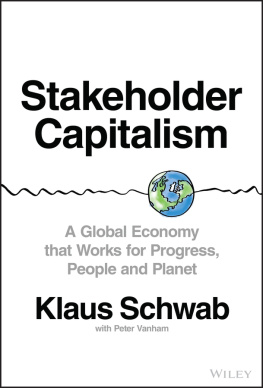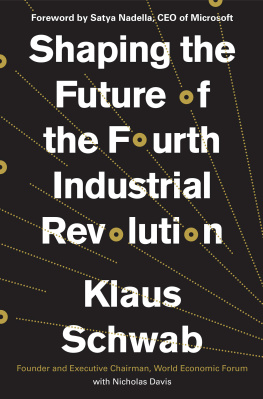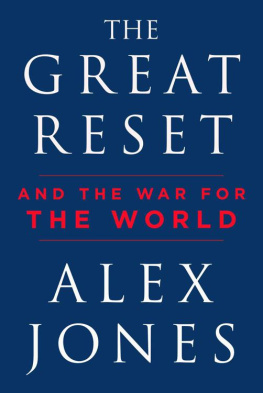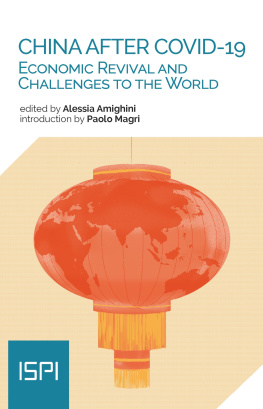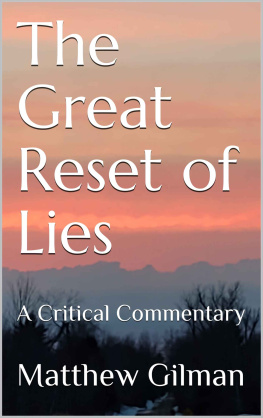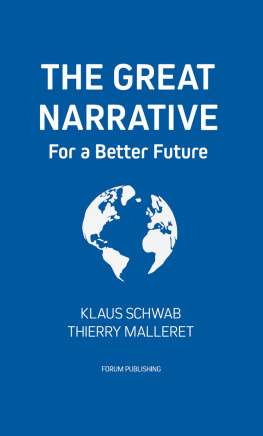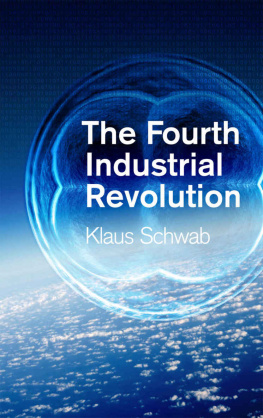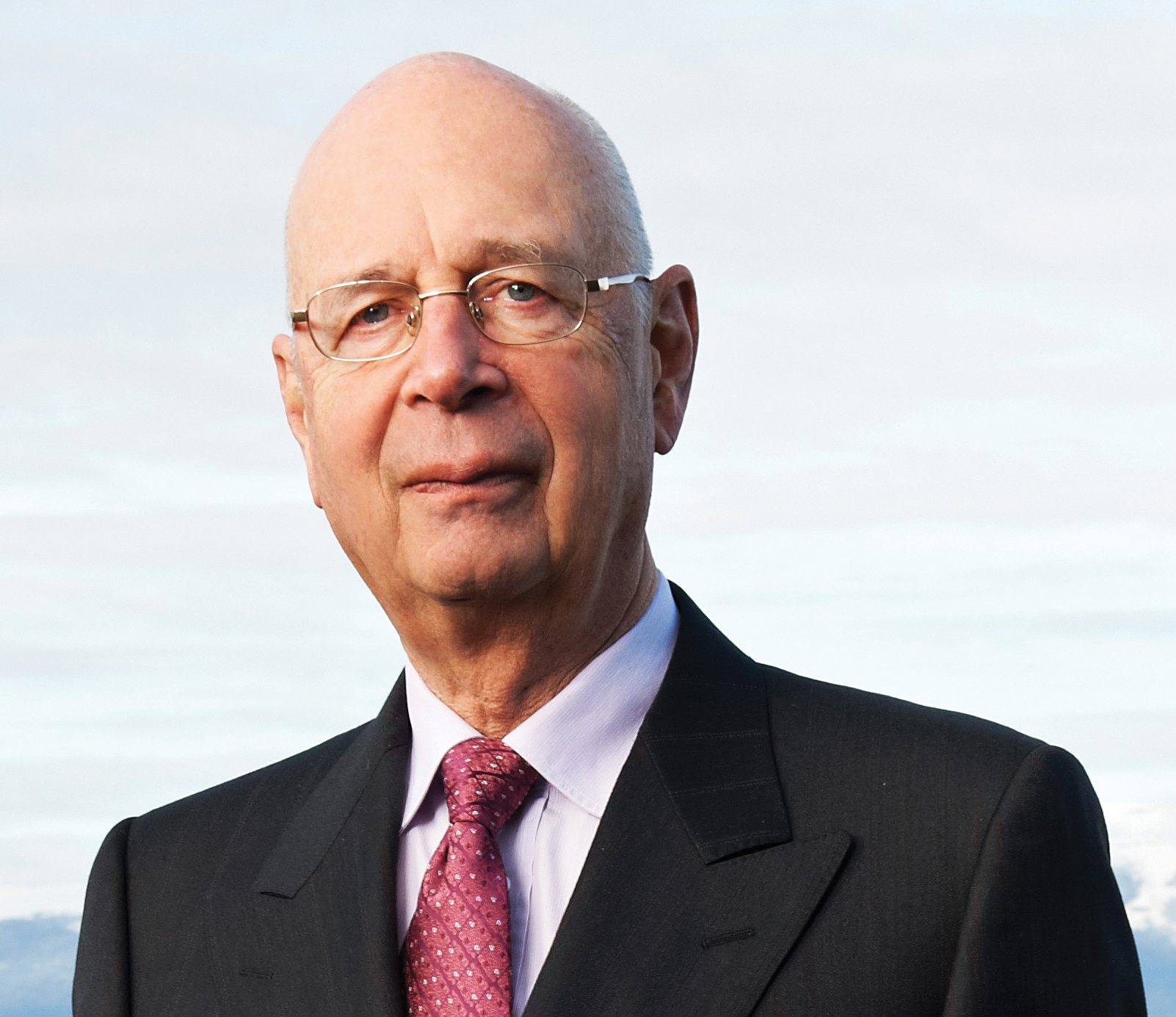COVID-19:
THE GREAT RESET
KLAUS SCHWAB
THIERRY MALLERET
FORUM PUBLISHING
Edition 1.0
2020 World Economic Forum All rights reserved No part of this publication may be reproduced or transmitted in any form or by any means, including photocopying or recording, or by any information storage and retrieval system.
World Economic Forum
91-93 route de la Capite
CH-1223 Cologny/Geneva
Switzerland
Tel.: +41 (0)22 869 1212
Fax +41 (0)22 786 2744
mail: contact@weforum.org
www.weforum.org
ISBN 978-2-940631-11-7
About Covid-19: The Great Reset
Since it made its entry on the world stage, COVID-19 has dramatically torn up the existing script of how to govern countries, live with others and take part in the global economy. Written by World Economic Forum Founder Klaus Schwab and Monthly Barometer author Thierry Malleret, COVID-19: The Great Reset considers its far-reaching and dramatic implications on tomorrows world.
The books main objective is to help understand whats coming in a multitude of domains. Published in July 2020, in the midst of the crisis and when further waves of infection may still arise, it is a hybrid between a contemporary essay and an academic snapshot of a crucial moment in history. It includes theory and practical examples but is chiefly explanatory, containing many conjectures and ideas about what the post-pandemic world might, and perhaps should, look like.
The book has three main chapters, offering a panoramic overview of the future landscape. The first assesses what the impact of the pandemic will be on five key macro categories: the economic, societal, geopolitical, environmental and technological factors. The second considers the effects in micro terms, on specific industries and companies. The third hypothesizes about the nature of the possible consequences at the individual level.
In early July 2020, we are at a crossroads, the authors of COVID-19: The Great Reset argue. One path will take us to a better world: more inclusive, more equitable and more respectful of Mother Nature. The other will take us to a world that resembles the one we just left behind but worse and constantly dogged by nasty surprises. We must therefore get it right. The looming challenges could be more consequential than we have until now chosen to imagine, but our capacity to reset could also be greater than we had previously dared to hope.
About the authors
Professor Klaus Schwab (1938, Ravensburg, Germany) is the Founder and Executive Chairman of the World Economic Forum. In 1971, he published Modern Enterprise Management in Mechanical Engineering. He argues in that book that a company must serve not only shareholders but all stakeholders to achieve long-term growth and prosperity. To promote the stakeholder concept, he founded the World Economic Forum the same year.
Professor Schwab holds doctorates in Economics (University of Fribourg) and in Engineering (Swiss Federal Institute of Technology) and obtained a masters degree in Public Administration (MPA) from the Kennedy School of Government at Harvard University. In 1972, in addition to his leadership role at the Forum, he became a professor at the University of Geneva. He has since received numerous international and national honours, including 17 honorary doctorates. His latest books are The Fourth Industrial Revolution (2016), a worldwide bestseller translated into 30 languages, and Shaping the Future of the Fourth Industrial Revolution (2018).
Thierry Malleret (1961, Paris, France) is the Managing Partner of the Monthly Barometer, a succinct predictive analysis provided to private investors, global CEOs and opinion- and decision-makers. His professional experience includes founding the Global Risk Network at the World Economic Forum and heading its Programme team.
Malleret was educated at the Sorbonne and the Ecole des Hautes Etudes en Sciences Sociales, Paris, and at St Antony's College, Oxford. He holds masters degrees in Economics and History, and a PhD in Economics. His career spans investment banking, think tanks, academia and government (with a three-year spell in the prime minister's office in Paris). He has written several business and academic books and has published four novels. He lives in Chamonix, France, with his wife Mary Anne.
CONTENTS
ACKNOWLEDGEMENTS
INTRODUCTION
The worldwide crisis triggered by the coronavirus pandemic has no parallel in modern history. We cannot be accused of hyperbole when we say it is plunging our world in its entirety and each of us individually into the most challenging times weve faced in generations. It is our defining moment we will be dealing with its fallout for years, and many things will change forever. It is bringing economic disruption of monumental proportions, creating a dangerous and volatile period on multiple fronts politically, socially, geopolitically raising deep concerns about the environment and also extending the reach (pernicious or otherwise) of technology into our lives. No industry or business will be spared from the impact of these changes. Millions of companies risk disappearing and many industries face an uncertain future; a few will thrive. On an individual basis, for many, life as theyve always known it is unravelling at alarming speed. But deep, existential crises also favour introspection and can harbour the potential for transformation. The fault lines of the world most notably social divides, lack of fairness, absence of cooperation, failure of global governance and leadership now lie exposed as never before, and people feel the time for reinvention has come. A new world will emerge, the contours of which are for us to both imagine and to draw.
At the time of writing (June 2020), the pandemic continues to worsen globally. Many of us are pondering when things will return to normal. The short response is: never. Nothing will ever return to the broken sense of normalcy that prevailed prior to the crisis because the coronavirus pandemic marks a fundamental inflection point in our global trajectory. Some analysts call it a major bifurcation, others refer to a deep crisis of biblical proportions, but the essence remains the same: the world as we knew it in the early months of 2020 is no more, dissolved in the context of the pandemic. Radical changes of such consequence are coming that some pundits have referred to a before coronavirus (BC) and after coronavirus (AC) era. We will continue to be surprised by both the rapidity and unexpected nature of these changes as they conflate with each other, they will provoke second-, third-, fourth- and more-order consequences, cascading effects and unforeseen outcomes. In so doing, they will shape a new normal radically different from the one we will be progressively leaving behind. Many of our beliefs and assumptions about what the world could or should look like will be shattered in the process.
However, broad and radical pronouncements (like everything will change) and an all-or-nothing, black-and-white analysis should be deployed with great care. Of course, reality will be much more nuanced. By itself, the pandemic may not completely transform the world, but it is likely to accelerate many of the changes that were already taking place before it erupted, which will in turn set in motion other changes. The only certainty: the changes wont be linear and sharp discontinuities will prevail. COVID-19: The Great Reset is an attempt to identify and shed light on the changes ahead, and to make a modest contribution in terms of delineating what their more desirable and sustainable form might resemble.


